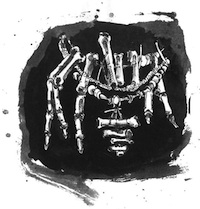In this episode of the life of the historical Buddha, Shakyamuni encounters the treacherous murderer, Angulimala, who subsequently transforms into a monk “more gentle than a handful of earth.” Excerpted from Old Path White Clouds, Thich Nhat Hanh’s biography of the Buddha, this story occurs after the Buddha has already acquired many followers among the laity and the ordained, or bhikkhus, and it reflects the interweaving of social and spiritual dimensions of his teaching. Angulimala’s change of heart proves that the present is not imprisoned by the past, that karma is not an immutable sentence, and that the forces of ignorance, even when they create the dementia of murder, can be subdued by compassion. In another radical departure from the prevailing ethos of the India of his day, the Buddha expressed unconditional love in the concrete terms of democratic social ideals, as demonstrated by his embrace of Angulimala.
One morning when the Buddha entered Savatthi, all doors were bolted shut. No one was on the streets. The Buddha stood in front of a home where he normally received food offerings. The door opened a crack, and the owner hastily ran out and invited him to enter. Once inside, the owner latched the door and suggested that the Buddha remain to eat his meal inside the house. He said, “Lord, it is very dangerous to go outdoors today. The murderer Angulimala has been seen in these parts. They say he has killed many people in other cities. Every time he kills someone, he cuts off one of their fingers and adds it to a string he wears around his neck. They say that once he has killed a hundred people and has a talisman of a hundred fingers hanging around his neck, he will gain even more terrible, evil powers.”
